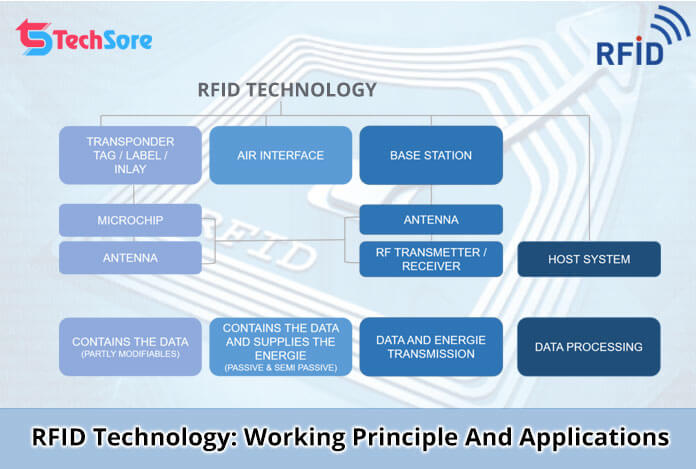The world we live in is constantly evolving, with advancements in technology reshaping various industries. One such innovation that is revolutionizing the way businesses operate is RFID technology. RFID, which stands for Radio Frequency Identification, is a wireless communication technology that enables the identification and tracking of objects or assets using radio waves. This groundbreaking technology has the potential to transform a wide range of sectors, from retail and logistics to healthcare and manufacturing. With its ability to automate processes and provide real-time data, RFID is paving the way for a more efficient and connected future. Read on to discover how RFID technology is making its mark across industries and unveiling a world of possibilities.
1. Applications of RFID Technology

In today’s rapidly advancing world, RFID technology has emerged as a game-changer across various industries. From tracking inventory to enhancing supply chain management, the applications of RFID technology are transforming the way businesses operate.
One of the key areas where RFID technology has made a significant impact is in the retail industry. Retailers are leveraging RFID tags to streamline their inventory management processes. With RFID, retailers can accurately track and manage stock levels, allowing for more efficient replenishment and reducing out-of-stock situations. This ultimately improves customer satisfaction and helps retailers optimize their operations.
Another industry that has witnessed the revolutionary potential of RFID technology is healthcare. RFID-enabled wristbands and tags are being used to track patients, medication, and medical equipment. By implementing RFID systems, hospitals can enhance patient safety, reduce errors in medication administration, and improve the overall efficiency and effectiveness of healthcare delivery.
The logistics and transportation industry has also harnessed the power of RFID technology to enhance visibility and streamline operations. RFID tags attached to shipping containers, pallets, and parcels enable real-time tracking of goods throughout the supply chain. This not only allows for improved inventory management but also enables faster and more accurate shipping, leading to reduced delays and increased customer satisfaction.
Asset tracking
RFID technology is undoubtedly revolutionizing various industries, bringing increased efficiency, accuracy, and cost savings. With its ability to provide real-time data and streamline processes, RFID is set to continue transforming industries and shaping the future of business operations.
2. Advantages and Benefits of RFID Technology
RFID technology offers numerous advantages and benefits across various industries. It has revolutionized the way businesses operate and brought about significant improvements in efficiency and productivity.
Firstly, RFID technology enables seamless inventory management. By attaching RFID tags to products, businesses can easily track and monitor their entire inventory in real time. This eliminates the need for manual counting and reduces human errors, resulting in accurate and up-to-date inventory records. With this level of visibility, businesses can optimize their supply chain processes, reduce stockouts, and enhance customer satisfaction.
Secondly, RFID technology enhances asset tracking and management. With RFID tags attached to assets, businesses can effortlessly monitor their locations, movement, and usage. This streamlines asset tracking processes and helps prevent loss or theft. Additionally, businesses can schedule preventive maintenance based on accurate usage data gathered through RFID technology, prolonging the lifespan of assets and reducing downtime.
Lastly, RFID technology improves customer experience and streamlines operations in retail settings. By implementing RFID-enabled systems, retailers can provide faster and more accurate checkout processes. RFID tags embedded in products enable automatic scanning at the point of sale, eliminating the need for individual product scanning, which saves time and reduces long queues. Moreover, RFID technology enables retailers to implement efficient inventory replenishment systems, ensuring that popular items are always available for customers and minimizing out-of-stock situations.
In conclusion, RFID technology brings numerous advantages and benefits to industries across the board. From optimizing inventory management and asset tracking to improving the customer experience in retail, RFID technology is revolutionizing the way businesses operate and paving the way for a more efficient and productive future.
3. Challenges and Future Implications of RFID Technology
RFID technology is undoubtedly poised to revolutionize various industries by providing efficient tracking and identification capabilities. However, its widespread implementation does not come without challenges and potential implications for the future.
Firstly, one of the major challenges facing RFID technology is privacy concerns. As RFID tags are embedded in various objects, there is potential for unauthorized tracking and data collection. This raises significant ethical and legal questions surrounding the protection of individual privacy rights. Striking a balance between the benefits of RFID technology and ensuring privacy safeguards will be crucial for its sustainable adoption.
Secondly, the cost of implementing RFID systems can be a significant barrier for widespread adoption. While RFID tags have become more affordable in recent years, the infrastructure required to support them, such as readers and backend systems, can still be costly. Industries will need to evaluate the return on investment and consider the long-term benefits of implementing RFID technology.
Lastly, interoperability remains a challenge in the RFID ecosystem. Different industries and organizations often have their own standards and protocols, making it difficult for seamless integration and communication between systems. Advancements in standardization efforts will be necessary to ensure the full potential of RFID technology is realized across industries.
Looking into the future, RFID technology holds immense potential for transformative impact. As implementation becomes more widespread, businesses can expect improved inventory management, reduced loss or theft, and enhanced supply chain visibility. Additionally, RFID technology can enable real-time data tracking and analytics, leading to more informed decision-making and operational efficiency.
In conclusion, while RFID technology brings significant benefits to industries, challenges such as privacy concerns, cost, and interoperability must be addressed. By addressing these challenges and leveraging its potential, RFID technology has the power to revolutionize industries and enable a more connected and efficient future.
